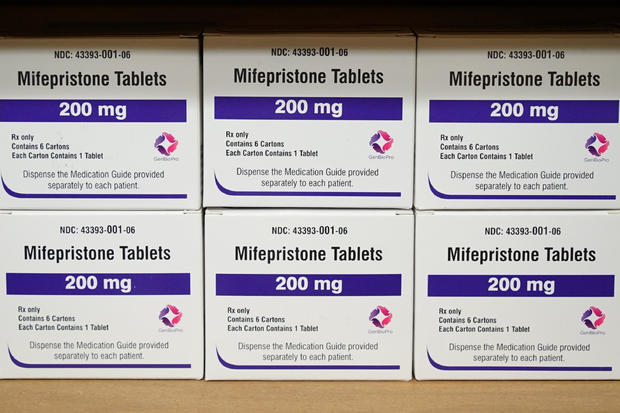Appeals court upholds FDA's 2000 approval of abortion pill, but would allow some limits
Washington — A federal appeals court upheld the Food and Drug Administration's 23-year-old approval of the widely used abortion pill mifepristone, but said a series of actions the agency took in recent years to make it easier to obtain went too far.
A three-judge panel from the U.S. Court of Appeals for the 5th Circuit issued a divided ruling Wednesday regarding an order from a federal district court in Texas. The panel agreed with the lower court that the agency's moves since 2016 to relax the rules for mifepristone's use should be reversed, but the majority declined to suspend the underlying approval of the medication.
The ruling will not affect availability of the drug, since the Supreme Court paused the entirety of the lower court's order as the appeals process plays out. The order issued by the high court in April ensured the drug will remain accessible until the justices either agree to take up the case and rule, or turn down a request to do so. The Justice Department said it will be asking the Supreme Court to review the 5th Circuit's ruling.
"This means that, until final judgment, Mifeprex will remain available to the public under the conditions for use that existed in 2016," the 5th Circuit's opinion on Wednesday said, referencing the name of the drug manufactured by the company Danco Laboratories.
The panel also said the FDA's 2019 approval of a generic version of mifepristone, made by the company GenBioPro, should be left in place and "will also be available under the same conditions as Mifeprix."
The panel of judges — which included Jennifer Walker Elrod, James Ho and Cory Wilson — noted its decision is subject to the earlier ruling from the Supreme Court. Ho said in a separate opinion that while he agrees with the majority that the 2016 and 2021 changes to mifepristone's rules must be set aside, he believes the FDA's initial approval in 2000 violated the agency's own rules and must also be invalidated.
Under the tighter rules that the 5th Circuit said it would reinstate, the drug can be taken up to seven weeks into a pregnancy, rather than 10, and can only be prescribed by physicians. It must also be dispensed in person, instead of by mail.
White House press secretary Karine Jean-Pierre said in a statement the administration disagrees with the court's ruling and believes it undermines the FDA's scientific judgement.
"Due to the Supreme Court's stay, mifepristone remains broadly available for now. But if the Fifth Circuit's ruling stands, it will significantly roll back the ability for women in every state to get the health care they need, and undermine FDA's scientific, evidence-based process for approving safe and effective medications that patients rely on," she said.
The legal fight over mifepristone
The appellate court panel's decision narrows an April 7 preliminary ruling from U.S. District Judge Matthew Kacsmaryk that suspended the FDA's 2000 approval of mifepristone, which is taken together with a second drug, misoprostol, to terminate an early pregnancy. Kacsmaryk has yet to consider the merits of the dispute.
The challenge involving access to mifepristone has been closely watched, as a decision curbing its availability would be far-reaching and impact states where abortion is legal. The ongoing court fight has also injected more confusion into a legal landscape upended by the Supreme Court's decision last June to overturn Roe v. Wade.
Since then, roughly half of the states have imposed near-total bans on abortion or implemented stringent rules restricting access. Some have sought to make it more difficult for people to obtain mifepristone, including through the mail.
The challenge to the FDA's approval of mifepristone was brought last November by a group of physicians and medical associations opposed to abortion rights. The group argued the agency failed to adequately consider the drug's safety and "chose politics over science" when it approved the pill in 2000.
In addition to urging the court to withdraw the FDA's approval, the challengers sought to roll back the series of steps taken by the agency since 2016 to make mifepristone easier to obtain. Among those actions were extending how late into a pregnancy the pill could be taken from seven weeks to 10 weeks, approving a generic version, expanding the health care providers who could prescribe mifepristone and allowing it to be dispensed by mail.
The FDA has argued that years of research show the rates of serious adverse events associated with mifepristone are low, and the drug has been taken by more than 5 million women seeking to end a pregnancy. Additionally, more than half of abortions in the U.S. are medication abortions, according to the Centers for Disease Control and Prevention.
But in his April 7 preliminary order, Kacsmaryk said the medical groups were likely to prevail in the case, and he put on hold the FDA's 2000 approval of mifepristone. He temporarily stopped the decision from taking effect to allow the Biden administration to appeal to the 5th Circuit.
In its own early order in response to a request for emergency relief from the Biden administration, the appellate court narrowed the district court's decision, finding that the medical associations waited too long to challenge the 23-year-old FDA approval, allowing it to stay in effect. But it blocked the FDA's actions since 2016 that eased the rules surrounding mifepristone's use, restoring the pre-2016 restrictions.
The Supreme Court then intervened and maintained the status quo.
The Justice Department's appeal of Kacsmaryk's decision was heard on May 17 by the three-judge panel. Elrod was appointed by former President George W. Bush, while Ho and Wilson were named to the 5th Circuit by former President Donald Trump.
In addition to contesting claims about mifeprstone's safety, the Biden administration argued that the medical associations and physicians who brought the case did not have the legal standing to do so, as they failed to show they would suffer a concrete harm if the FDA's approval and actions increasing access remained intact.
Lawyers for the Justice Department, representing the FDA, also told the courts that the plaintiffs were outside a six-year statute of limitations for challenging the 2000 approval. Joined by former FDA officials and Democrats in Congress, they warned that if the district court's ruling is upheld, it would open the door to more challenges of FDA-approved drugs.
But attorneys with the Alliance Defending Freedom, a conservative organization representing the medical groups and doctors, said they can be harmed if they're forced to complete surgical abortions due to incomplete medication abortions in violation of their conscience rights.
Lawyers challenging mifepristone's approval also claimed that victims of sex trafficking or abuse have "other methods of obtaining abortion" if mifepristone is taken off the market, including surgical abortion. She did not, however, acknowledge that there are near-total bans on abortion in more than 12 states, including Texas, where the lawsuit was filed, and Louisiana, where arguments before the 5th Circuit took place.
The 5th Circuit's decision
In the majority opinion written by Elrod, the 5th Circuit panel disagreed with the Biden administration on the question of whether the doctors and medical groups have legal standing to bring their case, a topic that was debated at length during arguments in the spring.
The appeals court concluded that the challengers have standing, except when it comes to the 2019 approval of a generic version of mifepristone, since they showed they are likely to be injured by the FDA's actions. But the majority also ruled that the challenge to the FDA's 2000 approval of mifepristone is likely barred by a six-year statute of limitations.
The court, however, allowed claims related to the 2016 and 2021 changes to proceed. The majority found the challengers are likely to succeed on their argument that the FDA's loosening of the rules violated the federal law governing the agency rulemaking process.
"In loosening mifepristone's safety restrictions, FDA failed to address several important concerns about whether the drug would be safe for the women who use it," Elrod wrote. "It failed to consider the cumulative effect of removing several important safeguards at the same time. It failed to consider whether those 'major' and 'interrelated' changes might alter the risk profile, such that the agency should continue to mandate reporting of non-fatal adverse events. And it failed to gather evidence that affirmatively showed that mifepristone could be used safely without being prescribed and dispensed in person."
The court argued that "the public interest is disserved by a drug that does not afford adequate protections to its users."
"On this record and at this preliminary stage, the Medical Organizations and Doctors have made a substantial showing that the 2016 Amendments and 2021 Non-Enforcement Decision were taken without sufficient consideration of the effects those changes would have on patients," Elrod wrote.
In response to the 5th Circuit's decision, Evan Masingill, the CEO of GenBioPro, which makes the generic version of mifepristone, said the company will use its legal and regulatory tools to ensure continued access to mifepristone.
"We remain concerned about extremists and special interests using the courts in an attempt to undermine science and access to evidence-based medication, as well as attempts to undermine the [FDA]'s regulatory authority," he said in a statement.
Alexis McGill Johnson, president and CEO of Planned Parenthood Federation of America, criticized the 5th Circuit's decision and said it shows that mifepristone's approval remains at risk.
"Pregnant people should be the ones who make decisions about their own health care, and medical professionals should be the ones who make evidence-based decisions about the safety of medications — not judges," she said in a statement. "The Supreme Court should reject this clearly baseless and political attempt to interfere with our ability to get health care."
But Susan B. Anthony Pro-Life America, an anti-abortion rights organization, accused the FDA of jeopardizing women's health by allowing mifepristone to be obtained through the mail.
"Mail-order abortion pills put thousands of women and girls at risk of serious complications from abortion pills every year," the group's state policy director Katie Daniel said in a statement. "We won't rest until the FDA and the profit-driven abortion industry are held accountable for the suffering they've inflicted on women and girls, as well as the deaths of countless unborn children."




